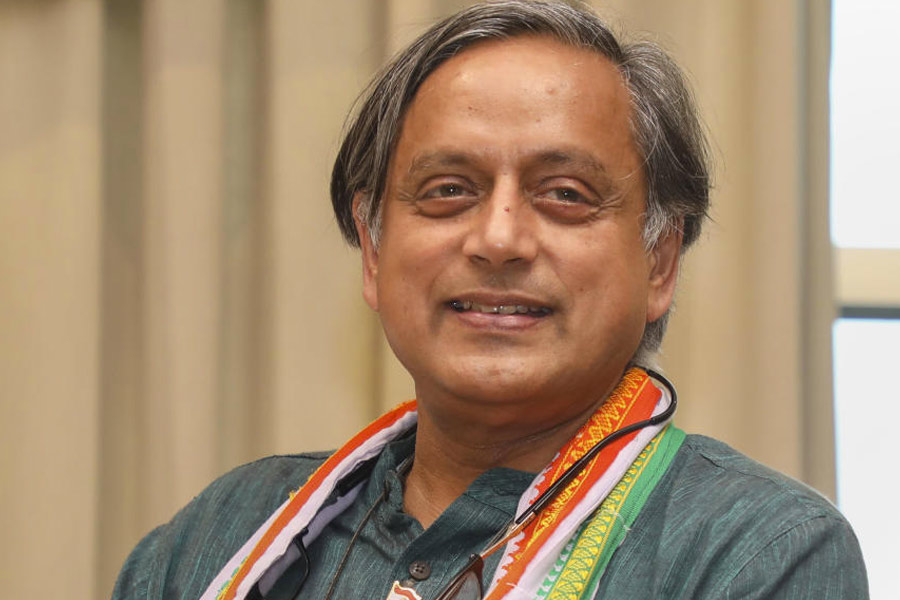Congress MP Shashi Tharoor refuses to relinquish Ram to the BJP.
“BJP has no monopoly over Ram,” he reiterated in a talk at the Kolkata Literature Festival in association with The Telegraph at the Calcutta Book Fair on Saturday.
The first question from the audience after his talk on “The world disorder” was on a more pressing domestic matter. What did he think about the Ram temple in Ayodhya, asked a young girl.
“I don’t go to temples for political reasons, so Congress did not attend the temple consecration event. As individuals, we will go to the Ayodhya temple. So will all of you. We encourage people to practise their faith,” he said.
On another audience question about whether there was a Right-wing wave across the world, the former UN diplomat said: “There is a huge backlash against liberalism and cosmopolitanism. There is a rise of hyper-nationalism and a de-globalisation. Countries are getting rooted in their religion and faith.”
David Goodhart in his book The Road to Somewhere talks of “somewhere” and “anywhere” people. Anywhere people attend international conferences, consider the world their home. And somewhere people are rooted in one country, one religion, one language, said Tharoor.
But there is hope. Brazilian dictator Bolsonaro lost, and so did Trump in the 2020 election though Turkey’s President Recep Tayyip Erdogan managed to win.
Tharoor spoke of two kinds of nationalism: civic nationalism and ethno-nationalism. “There is an attempt to change civic nationalism with ethno-nationalism,” he said.
He also outlined the difference between patriotism and nationalism. While patriotism is like a mother’s love — unconditional — nationalism is love towards the State. “A patriot will die for his country while a nationalist will kill for his State,” he said.
Despite Prime Minister Narendra Modi’s rhetoric on India’s place in the world, the best-selling author said: “We will be judged by the strength of our democracy. Our international standing has gone down under this government. There is a lot of negative writing in all foreign press. The Swedish institute V-Dem has called us an electoral autocracy.
“Back in 2004, when I had travelled to the UAE, senior ministers were overwhelmed that a party had won elections that had a foreign-born leader who asked a Sikh to be Prime Minister and (the country had) a Muslim as President. Today, we do not have any Muslim as a minister.”
In his talk on the world disorder, Tharoor said: “Order was supposed to be established after two world wars, civil wars, the Holocaust, Hiroshima. Institutions like the United Nations, Security Council and Bretton Woods institutions were established and we thought we would have a long era of peace. But in actuality, conflicts were pushed to the edges.
“...Now there is a horrendous war in Gaza. So the perception is that the world is in disorder. US sanctions against Russia are affecting other countries, debts are rising in other countries.”
Israel ties
“In the Middle East, India is much closer to Israel. India has strong bilateral ties with the country. Modi was the first Indian Prime Minister to visit Israel, and Netanyahu has visited India twice,” Tharoor said.
“Initially, India was far more sympathetic to Israel. The tenor of tweets of Modi and that of the ministry of external affairs was different during the Hamas attack and subsequent war, with MEA tweeting in support of the two-nation presence in Gaza.
“Modi has tried to position India as the voice of the global south.... We were completely isolated from the global south and even from some countries of the global north. And if China were to take a more belligerent posture, we must harden our stance.”
US ties
Tharoor said: “Every government of India is wedded to a strategic autonomy. After 200 years of colonial rule, we do not want to align. John Foster Dulles, as secretary at the Eisenhower government, had asked, “Are you with us or against us”; Nehru had answered, “Yes”.
“When we signed the 20 Years Treaty with Russia, we were seen as tilting towards Russia, now we are tilting towards the US.”
Neighbours
Some small countries have a chip on their back, Tharoor said. Bangladesh is in a similar situation. The Maldives’ elected government was hostile to India. “Gratitude doesn’t go far in international affairs. We helped them during their military coup, we gave them water when their water plant broke down. And yet they are hostile to us,” Tharoor said. “So our periphery does not look good. With Maldives, our relationship is bad; with Sri Lanka, it isn’t so bad; with Bangladesh, particularly after its Opposition-less election, the relation seems okay; China is influencing Bhutan and Nepal; we are not talking with Pakistan. Not all of this is our fault.”











